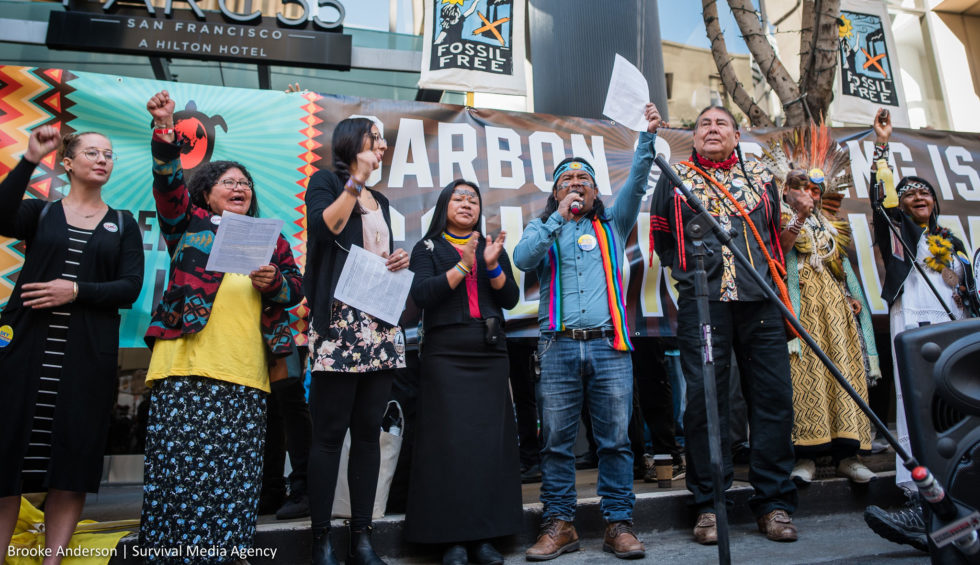
Media Contact: Adrien Salazar, adrien@ggjalliance.org
As Congress delayed a vote last night on the bipartisan infrastructure bill, blowing past an artificial deadline set by Democratic leaders, grassroots organizations urge members of Congress to continue to deliver on climate solutions, care investments, and justice and to hold the line against dirty energy investments that harm communities in the full budget reconciliation package.
Organizations in the United Frontline Table, representing hundreds of grassroots groups across the United States and U.S. territories, release the following statement:
The bipartisan infrastructure bill on its own will not provide equitable recovery and investment for Black, Indigenous, Latinx, Asian, Pacific Islander, and poor communities. In fact the bill invests in fossil fuels and false solutions that will continue to harm the most vulnerable. This bill is not going to serve our communities. As Congress pivots back to advance the budget reconciliation process, we recognize the budget reconciliation bill too is only a start to the recovery we need out of deep overlapping crises we face at this moment.
The combined bipartisan infrastructure bill and reconciliation budget–the Build Back Better agenda–are both too much and not enough. The Build Back Better package invests too much in false solutions, band-aid approaches, unproven and potentially harmful technologies, and market-based schemes that we know don’t work. And the package invests not enough in the communities with critical needs. We need the full package, both the bipartisan bill and the budget reconciliation package, but we need both to be better.
Our analysis of the current combined budget and bipartisan infrastructure bill estimates that over $181 billion in investments will go to false solutions that could harm communities. Included in the bipartisan package and the initial House reconciliation budget are investments for development and deployment of carbon capture technology, nuclear energy, biofuels of multiple forms, waste incineration, a Clean Energy Payment Program that could incentivize harmful technologies, and funds to support continued fossil fuel development and extraction.
As this budget package is finalized, we urge Congress to remove these harmful investments. If these investments remain in the final Build Back Better package, they will ensure that the next decade is full of harm and increased climate chaos at a time when we must quickly and drastically change course.
When it comes to stopping climate change, reducing emissions at source, and safeguarding frontline communities, harmful investments will only further exacerbate the interconnected environmental, economic, white supremacist and democratic crisis we face. At this critical moment in history, we call on members of Congress to lead in step with those communities most impacted, and to not continue to cower to the same old fossil fuel corporations putting neoliberal profit-driven ventures over comprehensive solutions that actually solve these crises.
This budget also contains key funds grassroots communities have fought for, and these must be defended by members of Congress in the days ahead. The current House budget reconciliation bill includes massive investments that are only on the table because the most impacted communities at the grassroots organized and demanded them. It includes investments to expand clean public transportation, upgrade school buildings, replace lead pipes across the country, invest in home and community care, expand affordable housing, reduce toxic pollution in communities, advance environmental justice, and fund oversight and accountability of the entire budget including ensuring funds go directly to the most disadvantaged communities.
These investments are in this package because our communities have fought for them, but none of them are guaranteed until the budget is signed by the President. We demand Congress maintain them at the highest levels, all the way to the final version of the bill.
As we come to the final stretch of this Congressional budget process we call on members of Congress to immediately:
- At a minimum, remove public funding and investments in the draft budget reconciliation bill and the bipartisan infrastructure bill that will devastate and further harm our communities including financing for carbon capture technology, nuclear energy, biofuels, waste incineration, and continued fossil fuel development and extraction. This requires that all fossil fuel subsidies within the package be removed.
- Maintain the highest levels of investment for the deployment of justly-sourced, distributed renewable energy, to reduce emissions at the levels required to limit global warming to 1.5° Celsius or less, including deploying wind and solar nation-wide, and investing in supports for a just transition for impacted communities, including for rural electric cooperatives.
- Pass a reconciliation budget that maintains the highest levels of investment for real community-driven solutions — addressing roots causes of the climate crisis, expanding public transit, investing in public and affordable housing, expanding the care economy, establishing a path to citizenship, expanding affordable public healthcare, tying investments to equity and environmental justice standards, while stopping dirty energy.
- Ensure set-asides in all programs to direct at least 50 percent of all program funds and investments to disadvantaged frontline communities, to meet and exceed the goals set forth in the Justice40 Initiative set forth in Executive Order No. 14008.
- Include strong oversight of the full scope of social, economic, and environmental impacts of all investments by the OMB and GAO, including oversight of the distribution of public funds and the implementation of the Justice40 Initiative, and strong consultation with community stakeholders.”
Now is not the time for Democrats to cower to right-wing ideologues on either side of the political aisle. Now is the time for bold action. If Congress and the administration want to claim that this package is historic on climate, jobs, and justice, then they must invest in real solutions to climate, economic and racial crisis at the highest levels possible, and ensure this budget is free of public investments that harm communities.
